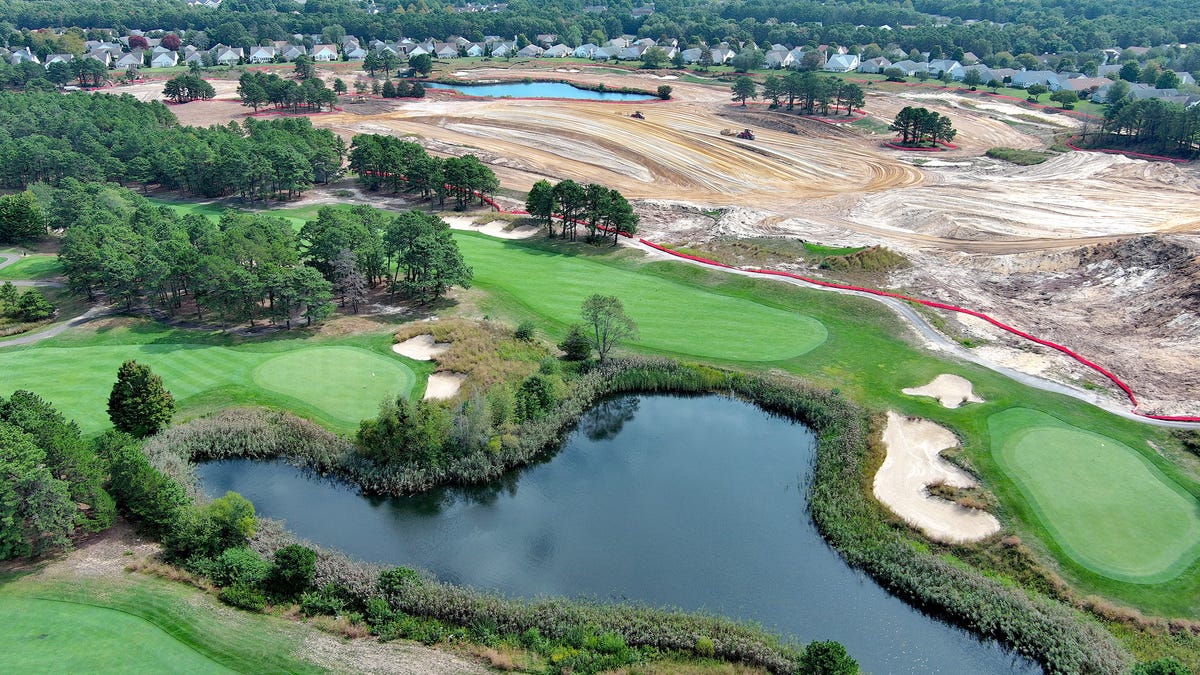
Golf holes cleared at Lakewood’s Eagle Ridge course for homes and reforestation
Nine of the twenty seven golf holes at Lakewood’s Eagle Ridge course have been cleared for homes, retail space and reforestation.
A new development plan that would take out at least 18 of Eagle Ridge Golf Club’s 27 holes is now on the table.GDMS Holdings, which still owns the golf course, recently applied for DEP approvals needed to build 305 duplex buildings, with more than 1,200 units.The site plan indicates the townhouses would cover most of the middle portion of the location and create about 20 new streets, leaving the southern area that had been a 9-hole course for reforestation“This was a really explosive thing,” Mayor Ray Coles recalls. “When they announced they were going to develop it, all hell broke loose.”
LAKEWOOD – At first glance, Eagle Ridge Golf Club doesn’t look like a place that would spark a housing battle involving twin lawsuits, environmental disputes and even an alleged home invasion and hospitalization.
But from the moment the golf course owners announced plans in 2016 to level much of the fairways and tee boxes and replace them with more than 900 townhouses and retail, a fight pitting neighboring residents against developers broke out.
“This was a really explosive thing,” Mayor Ray Coles recalls. “When they announced they were going to develop it, all hell broke loose.”
Now fully underway, the development of a course that many golfers consider the jewel of the region – with three separate 9-hole courses known as the Ridge, the Pines and the Links – not only angered the players and nearby homeowners who covet the course as a key asset, but fed the narrative of overdevelopment in the state’s fast-growing municipality.
By 2018, two lawsuits had been filed by nearby residents, one against former golf club owners, the Kokes Family, and one against the current owners, GDMS Holdings LLC.
Residents of the nearby Fairways at Lake Ridge community claimed they were misled into believing they would be living next to a public golf course for the foreseeable future when they bought their homes in the 1990s.
Accusations and complaints became so acrimonious that one senior couple said they were attacked in their home as a result, claiming that an assailant said to them, “So you don’t like duplexes in your neighborhood?”
Frederick “Rob” Robison, 66, and his wife, Patricia Robison, 64, were hospitalized for weeks after the attack in August 2018 and claimed years later to have brain damage from the assault. Lakewood Police this month rejected requests for police reports on the case, which they claim is still under investigation, while the Ocean County Prosecutor’s Office is similarly mum. The Robisons eventually moved to Florida.
Both related lawsuits were settled out of court and the building plans shelved. The attackers were never caught. Golfing went on.
Bulldozers, housing and retail
Fast forward to 2025, however, and a new development plan that would take out at least 18 of the course’s 27 holes is now on the table.
Even before any construction has been approved or begun, the golf course removed one of the favorite 9-hole sections, called The Ridge, and started preparing it for reforestation as bulldozers grind away adjacent to the middle course, The Pines.
GDMS Holdings bought the golf course from the Kokes in 2017 for $18 million, according to records. The developer recently applied for DEP approvals needed to build a smaller development, which would include 305 duplex buildings, with 610 units and 610 basement apartments, according to a site plan released by the DEP.
The project would have five community centers, 44,662 square feet of retail space, and related parking areas and driveways.
“It is a disaster,” said Maggie Wolter, 83, who has lived in the Fairways for more than a decade. “It’s going to be a lot of crap to look at.”
She said she still golfs weekly and had planned on having the large course nearby forever. “That is the whole reason we bought there,” Wolters aid. “To have the golf course.”
The site plan indicates the townhouses would cover most of the middle portion of the location and create about 20 new streets, leaving the southern area that had been a 9-hole course for reforestation.
A 9-hole course, known as the Links, in the northern section, would remain and is built on a former garbage dump, making it restricted for future development, according to DEP officials.
A DEP spokesperson said the reforestation was required as part of a 2021 settlement of one of the lawsuits “which requires the establishment of a vegetated buffer area between the neighboring development and proposed development on the Eagle Ridge Golf Course property.”
She added that it is also required “to satisfy their vegetative cover requirements under Subchapter 13 of the Coastal Zone Management Rules.”
The spokesperson would not release the settlement, citing confidentiality and did not indicate which lawsuit required it.
Golfers grumble and lament the destruction
Regular golfers said the elimination of the first nine holes is already diminishing the course’s attractiveness and useability.
“I don’t like it,” said Bob Melle, who spoke as he worked the Eagle Ridge driving range. “When they close off holes, you have less golf.”
Josh Pascale of Forked River said it was “a disappointment to me. The more holes, the better.”
Laszlo Karaski of Lakewood called Eagle Ridge “the best golf course around,” adding, “it was the ultimate place to come to, it offered three, 9-hole courses and a beautiful layout.”
Mordechai Sternstein, listed as principal of GDMS Holdings, did not respond to repeated requests for comment. GDMS bought the golf course from the Kokes Family in 2017.
Eagle Ridge General Manager Allen Dupuy also did not respond.
Did residents get defrauded when they bought homes?
Township officials said GDMS has yet to submit any new plans for construction or zoning approval. Coles said it was not surprising that the developers would hold off on seeking specific site plan approval until the DEP issues are completed.
Land records indicate GDMS bought Eagle Ridge Golf Club for $18 million in 2017 from the Kokes.
“They put millions of dollars in this already. They are working with the DEP to see what they could do about moving it around,” Coles said. “Until they know what they can do and where they can do it, they do not want to put more money into a plan if it is not feasible. If the project fits into the zone, they go to the planning board. If not, they have to go to the zoning board.”
While some golfers are opposed to the move and a few neighbors are speaking out, there has yet to be an organized wave of opposition equal to what occurred just a few years ago when the two lawsuits were filed.
The first legal challenge in 2017, led by attorney Ronald L. Lueddeke, was a class action lawsuit against the former course owners, The Kokes family, which claimed the residents were victims of fraud when they paid, in some cases, $75,000 premiums, to live in the development that included the golf course.
The Kokeses argued that paperwork given to home buyers was clear that the golf course was independent and not part of the Fairways.
“They sold the golf course for redevelopment when people thought it would be there forever,” Lueddeke said about the case, which was settled out of court.
In the other case, The Fairways homeowners’ association claimed that Lakewood’s master plan process was illegal and riddled with conflicts of interest. Attorney Michelle Donato, who represented the homeowners, argued the golf course was open space that must be preserved under the ordinance that allowed the Fairways to be built decades ago.
Both cases were settled out of court.
Lueddeke said he is not involved in any new litigation and does not know of any, while Donato declined to coment.
Calls to the Fairways homeowners association were not returned.
Coles said he does not believe there is as much opposition to the new development plan given the DEP reforestation requirement. He also said many of the former Fairways residents have moved and new homeowners are not as interested in the golf course connection.
“The folks that were against it were moving out,” the mayor said. “They fought it but like a lot of folks they decided it wasn’t worth it.”
Joe Strupp is an award-winning journalist with 35 years’ experience who covers Lakewood and several local communities for APP.com and the Asbury Park Press. He is also the author of four books, including Killing Journalism on the state of the news media, and an adjunct media professor at Rutgers University and Fairleigh Dickinson University. Reach him at jstrupp@gannettnj.com and at 732-413-3840. Follow him on Twitter and TruthSocial at @joestrupp







